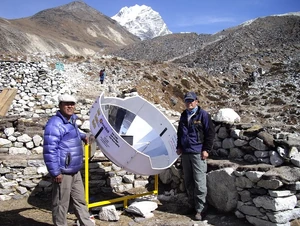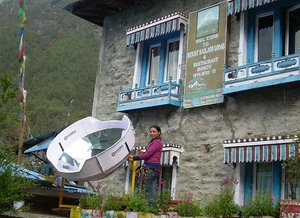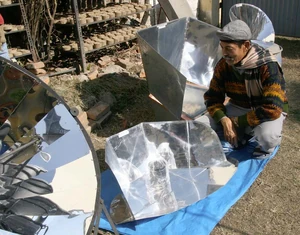
Solar cookers in the Himilayas

Solar cookers in the Himilayas
- July 2010: Exodus travel group has managed to install several parabolic solar cookers in the Himalayas, at the gateway to the Everest region. An effort to help promote sustainability and provide a step towards limiting deforestation. More Information and photos...

Sanu Kaji Shrestha and FoST promote several types of solar cookers, as well as fuel-efficient stoves that burn special briquettes made from agricultural and industrial waste.
- March 2008: The BBC’s annual World Challenge competition honors individuals and organizations that make a difference through enterprise and innovation at a grassroots level. The top 12 projects were promoted on the television program BBC World and in Newsweek magazine, followed by a public voting period. Solar cooker promoter Sanu Kaji reports that his organization, Foundation for Sustainable Technologies (FoST), was a top three finalist, winning $10,000 for its Cooking Without Gas project. The project was selected over nearly 1,000 others. Kaji Shrestha is grateful for the votes and support from the solar cooking community. In a letter to Solar Cookers International, he wrote, “Part of the credit goes to you and your solar cooking network for lobbying, and untiring support in our efforts.” Congratulations to Kaji Shrestha and FoST for this well-deserved honor!
- December 2007: FoST of Nepal is one of the 3 finalists in the World Challenge 2007! As runner up FoST has won $10.000 in the global competition organized by BBC World, Shell and Newsweek.
- July 2007: Foundation for Sustainable Technology (FoST) celebrated its fifth anniversary in April. FoST designs, develops and disseminates low-cost, adaptable products that improve the quality of life of Nepal’s rural and urban poor. FoST is among 12 finalists, selected from a pool of nearly 950 applicants, for the "World Challenge 2007." The selected FOST project is called "Cooking without Gas" and is summarized on the World Challenge Web site as follows: "In 1995, Sanu Kaji Shrestha ran out of cooking gas. So too did nearly everyone else in Kathmandu, as a countrywide shortage set in. Demand was so great Sanu had to take three days off work to queue up for more fuel. This first-hand experience of his country’s dependence on external energy supplies set Sanu thinking. He began to look into sustainable energy technologies for the domestic market, researching existing designs and adapting them for the Nepalese market. In 2001 he retired from his day job to concentrate on bringing low-cost, high-efficiency energy technologies to Nepal’s rural and urban poor. Measures developed to date include simple yet ingenious solar cookers and briquette presses to make smokeless fuel from waste materials." The World Challenge competition honors individuals and organizations that make a difference through enterprise and innovation at a grassroots level. The finalists will be featured on BBC World television and in Newsweek magazine. The winner will receive a $20,000 prize. An excellent new documentary film by Gorp Productions showcases the work being done by FOST, with a focus on its efforts to promote smokeless briquette cook stoves and solar cookers.
- April 2007: The government of Nepal has adopted a rural energy policy aimed at reducing rural poverty and protecting the environment. The government hopes to encourage local organizations, nongovernmental organizations and cooperatives to develop a variety of new energy sources such as micro hydro, wind and solar. According to solar cooking promoter Sanu Kaji Shrestha, the government has recently increased its subsidy for some parabolic-type solar cookers to 4000 rupees per unit, while there also is a 50% subsidy on some solar box cookers. However, he says it is difficult to fulfill the government’s criteria for receiving subsidies. He estimates there are about 2500 solar cookers distributed in rural communities so far.
- November 2006: Ten years on, nearly 100,000 Bhutanese refugees going solar
- March 2006: The Centre for Rural Technology, Nepal is promoting solar cooker use by lodge owners and other entities involved in eco-tourism. With support from Germany-based Wuppertal Institute for Climate, Environment and Energy, 200 SK-14 parabolic solar cookers will be distributed in the country, reducing energy expenses and promoting the use of solar energy through eco-tourism. Contact: Ganesh Ram Shrestha
- March 2006: Vajra Foundation Nepal (VFN), in partnership with United Nations High Commissioner for Refugees (UNHCR), will receive over $850,000 from Dutch Postcode Lottery to expand its solar cooker program to six additional Bhutanese refugee camps. VFN’s first project, launched in 1998, has benefited over 2,000 families in Beldangi refugee camp. The expanded program will allow refugees to make nearly 7,500 solar cookers, to be used on a shared basis by over 14,000 families. Each family will also receive two cooking pots and a retained-heat cooker. Stichting Vluchteling and Vajra Foundation Holland helped procure funds.
